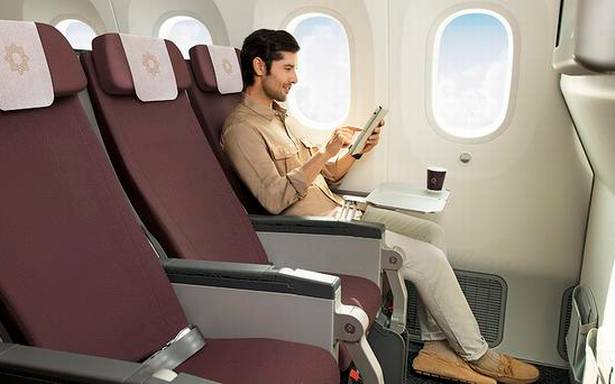Domestic carriers slow in offering the service.
Three years after the Department of Telecom permitted WiFi services on commercial flights, it is yet to become a reality for domestic air travellers as airlines grapple with the huge installation costs and the impact of COVID-19 on passenger demand.
Domestic carriers have been slow in offering the service because the retrofit of aircraft with the required antenna is an expensive affair that takes nearly 12 hours. Airlines also find it difficult to pass on the costs to their customers in an extremely competitive market where passengers grab the cheapest ticket. However, international airlines such as Lufthansa, Air France and Emirates, which were already providing Internet onboard but had to switch it off on entering India, have started offering the service in Indian skies too.
“The equipment costs ₹3 crore to ₹4 crore for one aircraft, which is the entry barrier because it is difficult to recover the cost from passengers. As customers start expecting this service and airlines increasingly treat it as an amenity instead of a value-added service, in-flight connectivity will evolve and mature,” says Shivaji Chatterjee, senior vice-president, enterprise business, Hughes Communications India Private Ltd.
Those airlines that have started to offer the service are rolling it out only on new aircraft that come equipped with the antenna.
Full-service carrier Vistara is the only Indian airline to offer the service to its customers since September 2020.
But the airline with a fleet of 50 offers the service only on four Airbus A321 Neos and two Boeing 787-9s that are used for international flights as these are new jets that come fitted with the equipment.
The service is available free of cost for all passengers till December 7 and users can send messages, e-mails and surf the Net.
“Streaming through platforms like Netflix is not offered. Moreover, we switch off the Internet if we use these planes on domestic routes,” according to the airline’s spokesperson. The airline also doesn’t allow any form of voice or video calls through WiFi Internet connectivity to ensure there is no discomfort to other passengers.
Back in October 2018, while taking the delivery of its first Boeing 737 MAX 8 that also come fitted with an antenna and other paraphernalia, low-cost airline SpiceJet said it would be the first airline to offer passengers internet services. Five months later, the aircraft were grounded globally following two crashes in Ethiopia and Indonesia that killed over 300 people.
The airline’s Chairman and Manging Director Ajay Singh told reporters at an event held to celebrate the resumption of Boeing 737 MAX 8 flights last week that it now plans to offer WiFi services on its aircraft from January 2022.
“Passengers will be able to receive WhatsApp messages, check mails, but we will disable audio because we don’t want to allow calls as they cause inconvenience to other passengers,” Mr. Singh said. The airline has 13 Boeing MAX 8 planes in its fleet, and will be inducting another 50 over the next two years.
The pandemic too has dented the appetite of airlines to innovate with new passenger amenities.
“What has happened is that since the regulation came into place, the pandemic has hit the industry. Airlines are struggling to get their flights back to normal and get consumer demand back to normal, which may take another one or two years,” explains Mr. Chatterjee.
Source: Read Full Article

